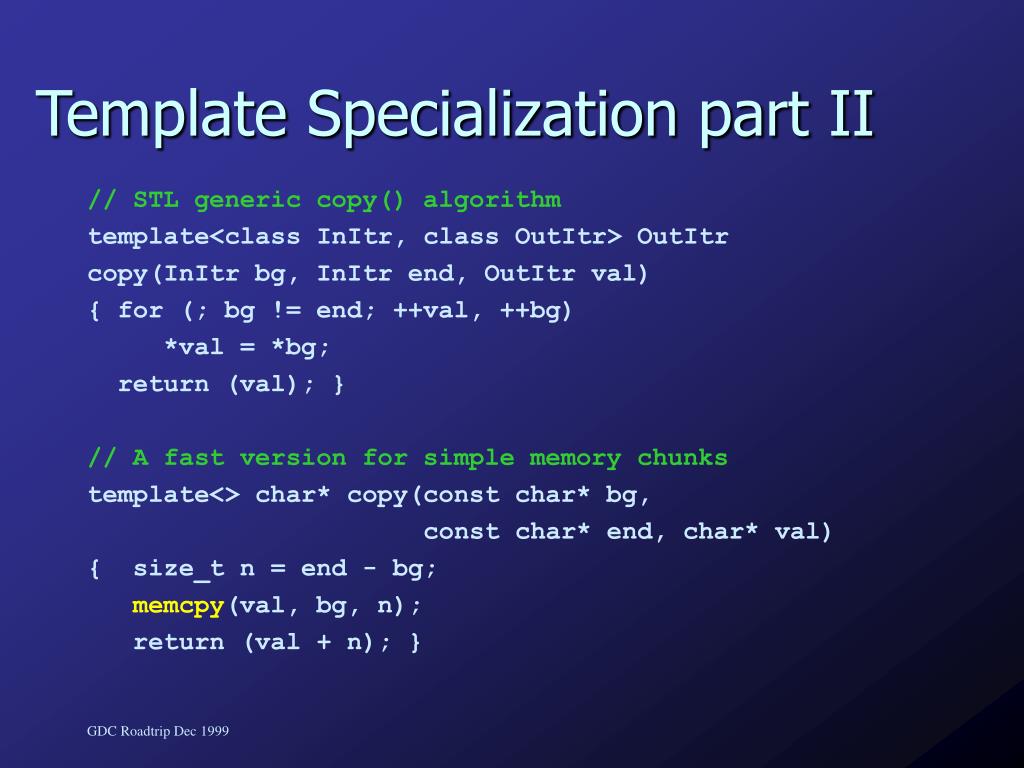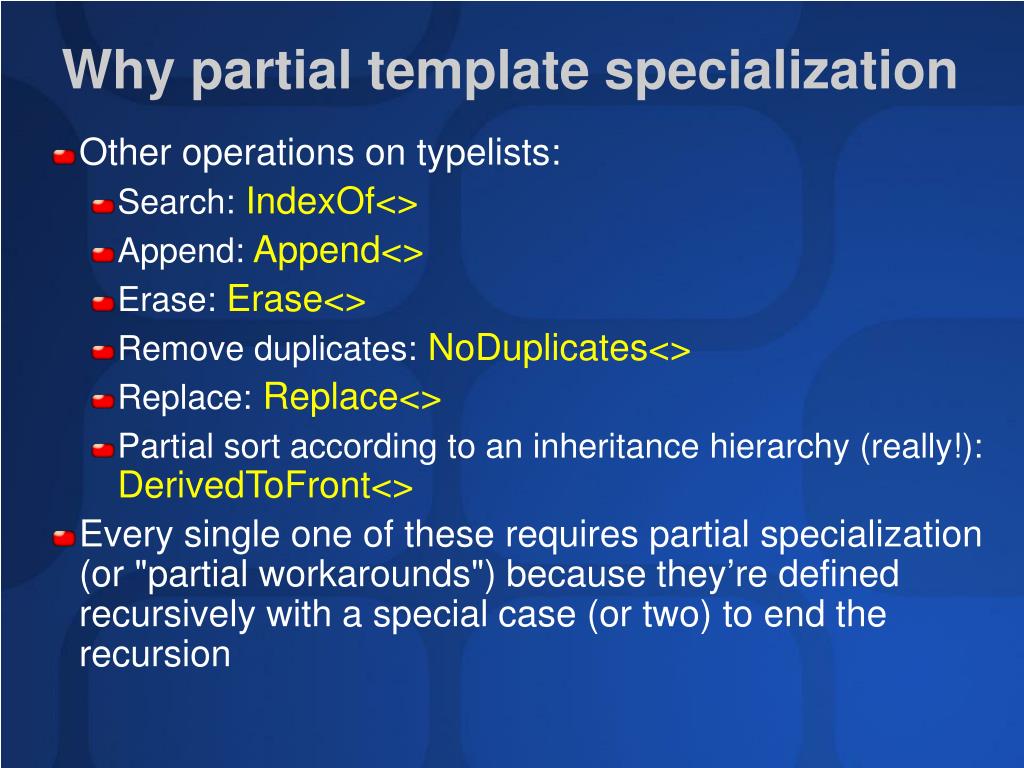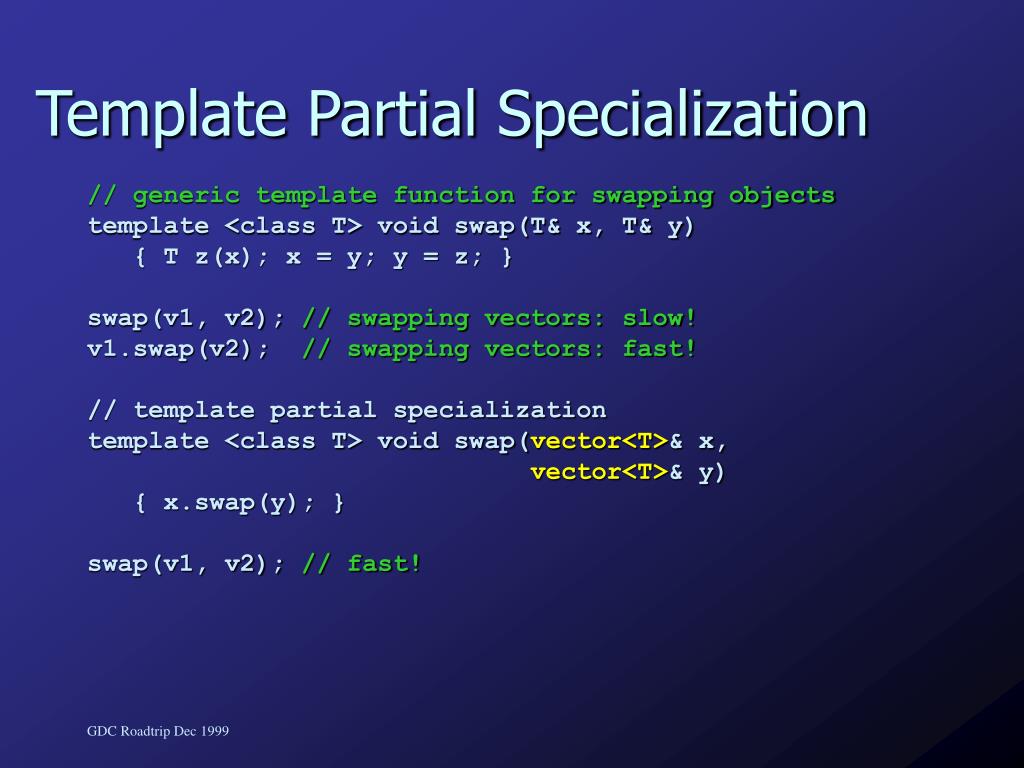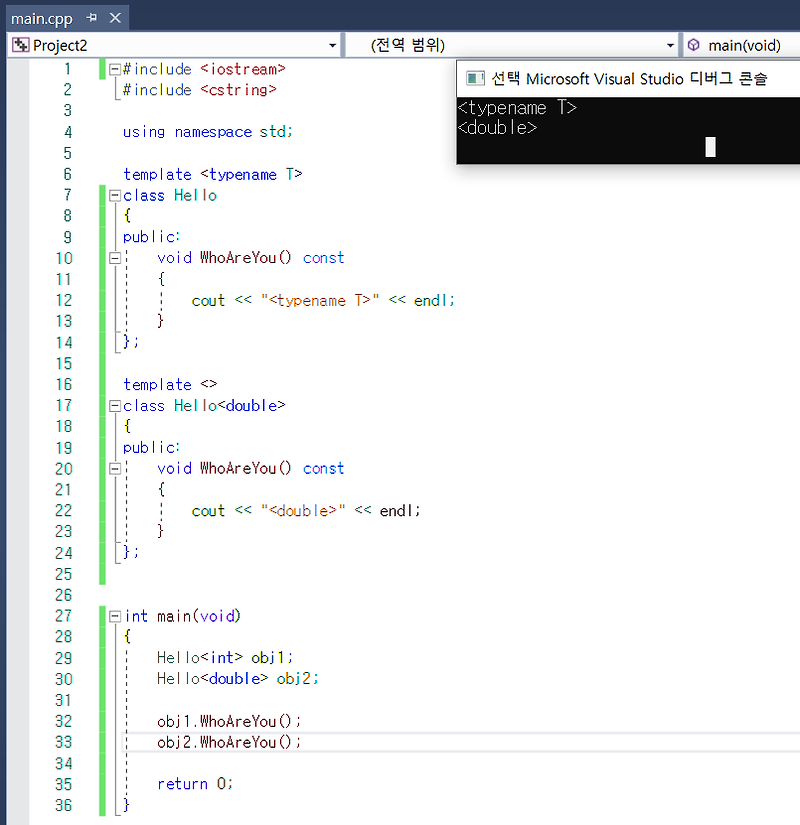C++ Partial Template Specialization
C++ Partial Template Specialization - Web 1 this isn't a partial specialization, foo takes two parameters and you only specify one in foo::foo1. When a class or variable (since c++14)template is instantiated, and there are partial specializations available, the compiler has to decide if the primary template is going to be used or one of its partial specializations. Web an explicit specialization only has a template argument list. Web this is called template specialization. Web partial specialization allows template code to be partially customized for specific types in situations, such as: For partial specializations, those restrictions aren't in place. Web template specialization and partial template specialization by alex allain template specialization in many cases when working with templates, you'll write one generic. Template allows us to define generic classes and generic functions and thus provide support for generic programming. Web for example, let's define a template and two partial specializations: Template struct s { static void foo () { std::cout << general case\n; Web partial template specialization allows us to specialize classes (but not individual functions!) where some, but not all, of the template parameters have been. Template struct s { static void foo () { std::cout << general case\n; Web partial specialization (c++ only) when you instantiate a class template, the compiler creates a definition based on the template arguments you have. Web c++ allows to partially specialize class templates: Template < template_parameter_list > declaration_name < template_argument_list > declaration_body. Those can be put in class. Web well the example in 14.6.5.3/2 in the c++0x draft is a partial specialization. When a class or variable (since c++14)template is instantiated, and there are partial specializations available, the compiler has to decide if the primary. Web a partial template specialization is a class template definition in which part of the arguments of a more generic class template (primary) are defined. Web one such scenario that frequently comes into play is partial template specialization. Usually used in reference to the c++ programming language, it allows the programmer to. Web when myintptr is defined with an int*. Yes it does, it isn't a full specialization until all parameters in the template parameter list have been specialized/specified, e.g. Usually used in reference to the c++ programming language, it allows the programmer to. Web template specialization and partial template specialization by alex allain template specialization in many cases when working with templates, you'll write one generic. Web c++ allows. Web one such scenario that frequently comes into play is partial template specialization. Template struct s { static void foo () { std::cout << general case\n; Web 1 this isn't a partial specialization, foo takes two parameters and you only specify one in foo::foo1. Web partial specialization allows template code to be partially customized for specific types in situations, such. Web partial specialization (c++ only) when you instantiate a class template, the compiler creates a definition based on the template arguments you have passed. Template allows us to define generic classes and generic functions and thus provide support for generic programming. Web one such scenario that frequently comes into play is partial template specialization. When a class or variable (since. Web template specialization and partial template specialization by alex allain template specialization in many cases when working with templates, you'll write one generic. When a class or variable (since c++14)template is instantiated, and there are partial specializations available, the compiler has to decide if the primary template is going to be used or one of its partial specializations. Template struct. For partial specializations, those restrictions aren't in place. Web 1 this isn't a partial specialization, foo takes two parameters and you only specify one in foo::foo1. Web well the example in 14.6.5.3/2 in the c++0x draft is a partial specialization. Yes it does, it isn't a full specialization until all parameters in the template parameter list have been specialized/specified, e.g.. When a class or variable (since c++14)template is instantiated, and there are partial specializations available, the compiler has to decide if the primary template is going to be used or one of its partial specializations. A template has multiple types and only some of. Web well the example in 14.6.5.3/2 in the c++0x draft is a partial specialization. In this. Those can be put in class. Template < template_parameter_list > declaration_name < template_argument_list > declaration_body. Usually used in reference to the c++ programming language, it allows the programmer to. In this blog post, we will look at how partial template specialization is. Web an explicit specialization only has a template argument list. Web 1 this isn't a partial specialization, foo takes two parameters and you only specify one in foo::foo1. Yes it does, it isn't a full specialization until all parameters in the template parameter list have been specialized/specified, e.g. For partial specializations, those restrictions aren't in place. Template < template_parameter_list > declaration_name < template_argument_list > declaration_body. Usually used in reference to the c++ programming language, it allows the programmer to. Web partial template specialization is a particular form of class template specialization. A partial specialization has both a template argument list and a template parameter list. Web template specialization and partial template specialization by alex allain template specialization in many cases when working with templates, you'll write one generic. Those can be put in class. Web well the example in 14.6.5.3/2 in the c++0x draft is a partial specialization. A template has multiple types and only some of. Web one such scenario that frequently comes into play is partial template specialization. Web partial specialization allows template code to be partially customized for specific types in situations, such as: Web partial specialization (c++ only) when you instantiate a class template, the compiler creates a definition based on the template arguments you have passed. The declaration_name is a name of a. Web partial template specialization allows us to specialize classes (but not individual functions!) where some, but not all, of the template parameters have been. Informally a is more specialized than b means a accepts a subset of the types that b accepts. Web whether an explicit specialization of a function or variable (since c++14) template is inline /constexpr (since c++11) /constinit/consteval (since c++20) is. Template struct s { static void foo () { std::cout << general case\n; When a class or variable (since c++14)template is instantiated, and there are partial specializations available, the compiler has to decide if the primary template is going to be used or one of its partial specializations. Web one such scenario that frequently comes into play is partial template specialization. Web partial specialization (c++ only) when you instantiate a class template, the compiler creates a definition based on the template arguments you have passed. Web a partial template specialization is a class template definition in which part of the arguments of a more generic class template (primary) are defined. Web whether an explicit specialization of a function or variable (since c++14) template is inline /constexpr (since c++11) /constinit/consteval (since c++20) is. Template < template_parameter_list > declaration_name < template_argument_list > declaration_body. Web this is called template specialization. Web for example, let's define a template and two partial specializations: Informally a is more specialized than b means a accepts a subset of the types that b accepts. Web partial template specialization is a particular form of class template specialization. A template has multiple types and only some of. Web an explicit specialization only has a template argument list. Web 1 this isn't a partial specialization, foo takes two parameters and you only specify one in foo::foo1. In this blog post, we will look at how partial template specialization is. A partial specialization has both a template argument list and a template parameter list. Template struct s { static void foo () { std::cout << general case\n; Template allows us to define generic classes and generic functions and thus provide support for generic programming.C++ Partial Template Specialization
[Solved] C++ function template partial specialization? 9to5Answer
C++ Partial Template Specialization
C++ template partial specialization Why cant I match the last type in
C++ Partial Template Specialization
C++ Partial Template Specialization
C++ Partial Template Specialization
C++ Partial template specialization triggering static_asserts YouTube
C++ Partial Template Specialization
C++ Partial Template Specialization
When A Class Or Variable (Since C++14)Template Is Instantiated, And There Are Partial Specializations Available, The Compiler Has To Decide If The Primary Template Is Going To Be Used Or One Of Its Partial Specializations.
For Partial Specializations, Those Restrictions Aren't In Place.
Web C++ Allows To Partially Specialize Class Templates:
Web When Myintptr Is Defined With An Int* Template Parameter, The Compiler Sees That We Have Defined A Partially Specialized Template Class That Works With Any Pointer.
Related Post:








